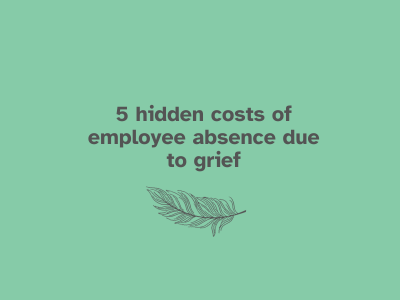5 hidden costs of employee absence due to grief
The extra costs to your business when an employee is grieving


When thinking about the impact of employee absence, we often consider the traditional factors such as illness or injury. However, one critical aspect that is often overlooked is the cost of an employee being off sick due to grief. Grief affects individuals differently, and it's crucial for businesses to understand the hidden costs associated with supporting their employees during these challenging times. In this blog, we will explore the tangible and intangible costs that arise when an employee is absent due to grief, and why investing in grief support programs can be beneficial for both employees and businesses.
Productivity Loss:
When an employee experiences grief, their ability to focus on work and perform at their optimal level is significantly compromised. The individual's mental and emotional state can make it difficult for them to concentrate, affecting their overall productivity. This can lead to delayed or incomplete tasks, errors, and decreased efficiency. Consequently, the work may be redistributed to other team members or remain unfinished, impacting the entire workflow and potentially causing a backlog of work.Increased Absence:
Grief can be a lengthy and complex process. Employees in mourning often require time off to attend funerals, handle legal matters, or simply take care of their emotional well-being. These prolonged absences can disrupt project plans, hinder team collaboration, and potentially strain coworkers who may need to compensate for the absentee's responsibilities. It's essential for businesses to recognise that their allocated bereavement leave may not fully address the need for time off during the grieving process.Impaired Team Morale:
Workplace morale is strongly influenced by the emotional well-being of employees. When one member of the team is off sick due to grief, it can have a ripple effect on team dynamics and overall morale. Colleagues may feel the absence of their teammate, experience heightened stress, or take on additional responsibilities, leading to burnout. This negative atmosphere can impact teamwork, creativity, and employee satisfaction, ultimately lowering overall productivity and engagement levels.Increased Healthcare Costs:
Unresolved grief can manifest physical symptoms such as fatigue, sleep disturbances, and weakened immune systems, which can result in additional healthcare expenditures. Employees who are struggling with grief may also require mental health support, further increasing healthcare costs for the business. Investing in grief support programs, such as counselling services or grief-focused workshops, can help individuals cope with their loss, minimise absence, and reduce long-term healthcare expenses.Reputation and Customer Service:
When an employee is off sick due to grief, it can have an indirect impact on customer service and the business's reputation. Grief can affect an individual's ability to interact professionally, concentrate on customer needs, and provide the level of service they typically deliver. Poor customer experiences can lead to dissatisfaction, loss of business, and damage to the company's reputation. Furthermore, if grief-related leave becomes frequent, it may portray the business as lacking empathy and support for their employees, impacting its image in the eyes of customers and potential recruits.
Conclusion:
The cost of an employee being off sick due to grief extends far beyond the immediate loss of work. The tangible and intangible costs of decreased productivity, increased absence, impaired team morale, healthcare expenses, and potential damage to reputation highlight the need for businesses to address the impact of grief in the workplace. By proactively investing in grief support programs such as my Grief Education offer, businesses can demonstrate their commitment to employee well-being and create a supportive environment that fosters productivity, engagement, and overall success.
It's essential for businesses to recognise the significance of employee grief and actively work towards providing the necessary support to employees during these challenging times. By doing so, businesses not only mitigate the costs associated with grief-related absence but also foster a compassionate work culture that values the well-being of their employees.




